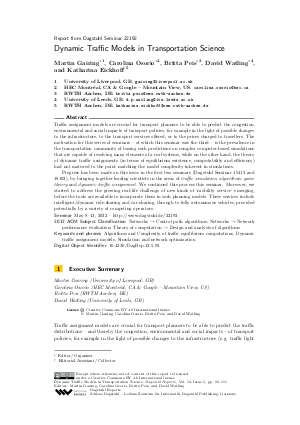Dynamic Traffic Models in Transportation Science (Dagstuhl Seminar 22192)
Authors Martin Gairing, Carolina Osorio, Britta Peis, David Watling, Katharina Eickhoff and all authors of the abstracts in this report
-
Part of:
Issue:
Dagstuhl Reports, Volume 12, Issue 5
Part of: Volume: Dagstuhl Reports, Volume 12
Part of: Journal: Dagstuhl Reports (DagRep) - License:
 Creative Commons Attribution 4.0 International license
Creative Commons Attribution 4.0 International license
- Publication Date: 2022-12-08
File

PDF
DagRep.12.5.92.pdf
- Filesize: 2.36 MB
- 20 pages
Document Identifiers
Subject Classification
ACM Subject Classification
- Networks → Control path algorithms
- Networks → Network performance evaluation
- Theory of computation → Design and analysis of algorithms
Keywords
- Algorithms and Complexity of traffic equilibrium computations
- Dynamic traffic assignment models
- Simulation and network optimization
Metrics
- Access Statistics
-
Total Accesses (updated on a weekly basis)
0Document
0Metadata
Abstract
Traffic assignment models are crucial for transport planners to be able to predict the congestion, environmental and social impacts of transport policies, for example in the light of possible changes to the infrastructure, to the transport services offered, or to the prices charged to travellers. The motivation for this series of seminars - of which this seminar was the third - is the prevalence in the transportation community of basing such predictions on complex computer-based simulations that are capable of resolving many elements of a real systems, while on the other hand, the theory of dynamic traffic assignments (in terms of equilibrium existence, computability and efficiency) had not matured to the point matching the model complexity inherent in simulations. Progress has been made on this issue in the first two seminars (Dagstuhl Seminar 15412 and 18102), by bringing together leading scientists in the areas of traffic simulation, algorithmic game theory and dynamic traffic assignment. We continued this process this seminar. Moreover, we started to address the growing real-life challenge of new kinds of 'mobility service' emerging, before the tools are available to incorporate them in such planning models. These services include intelligent/dynamic ride-sharing and car-sharing, through to fully autonomous vehicles, provided potentially by a variety of competing operators.
Cite As Get BibTex
Martin Gairing, Carolina Osorio, Britta Peis, David Watling, and Katharina Eickhoff. Dynamic Traffic Models in Transportation Science (Dagstuhl Seminar 22192). In Dagstuhl Reports, Volume 12, Issue 5, pp. 92-111, Schloss Dagstuhl – Leibniz-Zentrum für Informatik (2022)
https://doi.org/10.4230/DagRep.12.5.92
BibTex
@Article{gairing_et_al:DagRep.12.5.92,
author = {Gairing, Martin and Osorio, Carolina and Peis, Britta and Watling, David and Eickhoff, Katharina},
title = {{Dynamic Traffic Models in Transportation Science (Dagstuhl Seminar 22192)}},
pages = {92--111},
journal = {Dagstuhl Reports},
ISSN = {2192-5283},
year = {2022},
volume = {12},
number = {5},
editor = {Gairing, Martin and Osorio, Carolina and Peis, Britta and Watling, David and Eickhoff, Katharina},
publisher = {Schloss Dagstuhl -- Leibniz-Zentrum f{\"u}r Informatik},
address = {Dagstuhl, Germany},
URL = {https://drops.dagstuhl.de/entities/document/10.4230/DagRep.12.5.92},
URN = {urn:nbn:de:0030-drops-174441},
doi = {10.4230/DagRep.12.5.92},
annote = {Keywords: Algorithms and Complexity of traffic equilibrium computations, Dynamic traffic assignment models, Simulation and network optimization}
}
